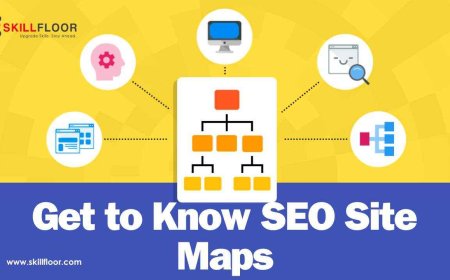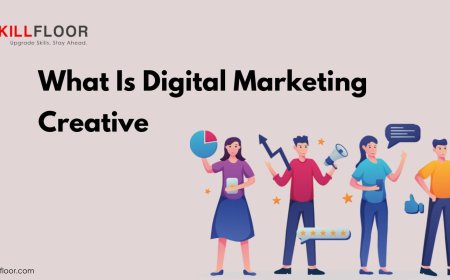The World of Digital Marketing: Your Friendly Guide
Discover the future of data science in digital marketing. Learn key trends, strategies, and tools to succeed in this ever-evolving field.

In today's digital age, the world of marketing has undergone a massive transformation. Traditional marketing methods are evolving, making way for a more dynamic and interactive approach known as digital marketing. If you're curious to understand what digital marketing is all about, you've come to the right place. In this blog, we'll demystify the concept of digital marketing in a friendly and approachable manner.
Defining Digital Marketing
In the fast-paced digital world we live in, marketing has taken on a new form known as digital marketing. But what exactly does it mean? Let's break it down in a friendly and easy-to-understand manner.
Digital marketing refers to the strategies and techniques used to promote products, services, or brands through online channels. It's like spreading the word about something you love but using the power of the internet to reach a larger audience.
Think of it this way: instead of relying on traditional methods like newspaper ads or TV commercials, digital marketing harnesses the vast potential of the internet to connect with people. It takes advantage of online platforms such as websites, search engines, social media, email, and mobile apps to catch people's attention and create meaningful interactions.Digital marketing is all about finding creative ways to capture the interest of potential customers and keep them engaged. It's like a digital dance, where businesses create captivating content, eye-catching visuals, and engaging messages to stand out in the online crowd.
Key Components of Digital Marketing:
Search Engine Optimization (SEO): SEO involves optimizing websites to rank higher in search engine results. By enhancing website visibility, SEO helps businesses attract organic traffic and increase their online presence.
Content Marketing: Content marketing focuses on creating and distributing valuable and relevant content to attract and engage target audiences. Blogs, articles, videos, and social media posts are common forms of content used to build brand awareness and establish thought leadership.
Social Media Marketing: Social media platforms like Facebook, Instagram, Twitter, and LinkedIn are powerful tools for reaching and engaging with customers. Social media marketing involves creating and sharing content, running targeted ads, and fostering meaningful interactions with the audience.
Email Marketing: Email marketing involves sending targeted and personalized emails to customers and prospects. It helps businesses nurture leads, promote products, and maintain long-term relationships with customers.
Pay-Per-Click (PPC) Advertising: PPC advertising allows businesses to display ads on search engines or social media platforms and pay only when users click on their ads. This method enables businesses to reach their target audience effectively and measure the return on investment (ROI) of their advertising campaigns.
Benefits of Digital Marketing:
Digital marketing offers numerous advantages for businesses of all sizes
Wide Reach: With the global presence of the internet, digital marketing allows businesses to reach a vast audience across geographical boundaries. It opens up new markets and customer segments previously untapped through traditional marketing methods.
Targeted Approach: Digital marketing enables businesses to target specific demographics, interests, and behaviors. This targeted approach ensures that marketing efforts are directed towards the right audience, increasing the chances of converting leads into customers.
Measurable Results: Unlike traditional marketing, digital marketing offers detailed analytics and tracking capabilities. Businesses can measure key performance indicators (KPIs) such as website traffic, conversion rates, and engagement levels to assess the effectiveness of their marketing campaigns.
Cost-Effective:Digital marketing is often more cost-effective than traditional marketing methods. Businesses can optimize their budgets by targeting specific audiences and utilizing cost-efficient channels like social media and email marketing.
Evolving Trends in Digital Marketing:
The world of digital marketing is constantly evolving. Some current trends include:
Influencer Marketing: Collaborating with influential individuals on social media platforms to promote products and services.
Video Marketing: Utilizing videos to convey messages, engage audiences, and showcase products or services.
Voice Search Optimization: Optimizing digital content to cater to the rising popularity of voice-activated search assistants like Siri and Alexa.
Mobile Marketing:
With the widespread use of smartphones, mobile marketing has gained immense significance. Businesses optimize their websites and create mobile-friendly experiences to cater to users accessing content on their mobile devices. Mobile apps, SMS marketing, and location-based targeting are also key elements of mobile marketing.
Data-Driven Decision Making:
Digital marketing provides businesses with a wealth of data and analytics. By analyzing customer behavior, engagement metrics, and conversion rates, businesses can make data-driven decisions to refine their marketing strategies, optimize campaigns, and improve overall performance.
Personalization:
Imagine walking into a store where everything feels tailor-made just for you. The products, the recommendations, and even the greetings—it's all personalized to your tastes and preferences. That's exactly what personalization in marketing aims to achieve, but in the digital world.
Personalization is like having a friendly virtual assistant who understands your unique needs and delivers a customized experience. It's all about making you feel special and valued as a customer by tailoring content, recommendations, and offers specifically for you.
In the realm of digital marketing, personalization involves using data and insights to create targeted and relevant experiences for individual customers. It's like having a digital genie who knows your preferences, shopping habits, and interests, and uses that knowledge to provide you with a more personalized and enjoyable journey.
Social Listening:
Have you ever wondered what people are saying about a brand, product, or topic on social media? Well, that's where social listening comes into play. Social listening is like being a friendly eavesdropper on social media platforms to gather valuable insights and understand what people are talking about.
In simple terms, social listening is the practice of monitoring social media platforms to listen to conversations, mentions, and discussions related to a specific brand, industry, or topic. It's like tuning into the chatter of a big online party and paying attention to what people are saying.
With social listening, businesses can gain a deeper understanding of customer opinions, preferences, and sentiment. It's like having a secret superpower to tap into the thoughts and feelings of the online community. By tracking brand mentions, hashtags, and keywords, businesses can uncover valuable feedback, identify trends, and even spot potential opportunities or challenges.
Interactive Content:
Digital marketing thrives on interactive content that encourages active participation from the audience. Polls, quizzes, contests, and live videos are examples of interactive content that engages users and fosters a sense of community and brand loyalty.
Continuous Optimization: Digital marketing offers the advantage of real-time monitoring and optimization. Businesses can track campaign performance, test different strategies, and make adjustments on the go. This iterative approach ensures that marketing efforts are constantly evolving and improving based on data-driven insights.
Building Customer Relationships: Digital marketing enables businesses to build strong and long-lasting relationships with customers. Through personalized communication, social media engagement, and timely responses to customer inquiries, businesses can nurture customer loyalty and advocacy, ultimately leading to repeat business and positive word-of-mouth referrals.
Adapting to Change:
The digital landscape is ever-evolving, and successful digital marketers understand the importance of staying up-to-date with industry trends and technological advancements. Being adaptable and open to embracing new digital marketing strategies ensures businesses stay ahead of the competition and continue to engage their target audience effectively.
At the end, Digital marketing has become an essential component of any successful marketing strategy. By leveraging the power of digital channels, businesses can connect with their target audiences, build brand awareness, and drive meaningful engagement. With its wide reach, targeted approach, measurable results, and cost-effectiveness, digital marketing offers endless possibilities for businesses to thrive in the digital landscape. Embrace the world of digital marketing.































































